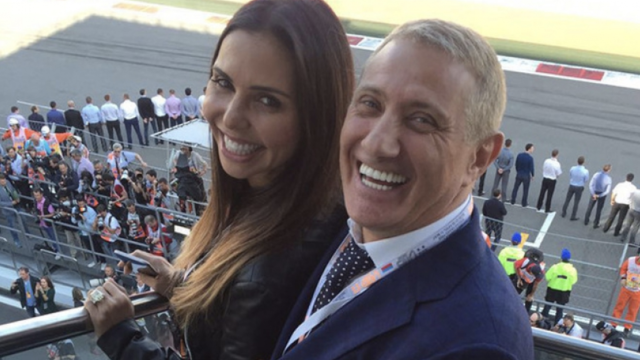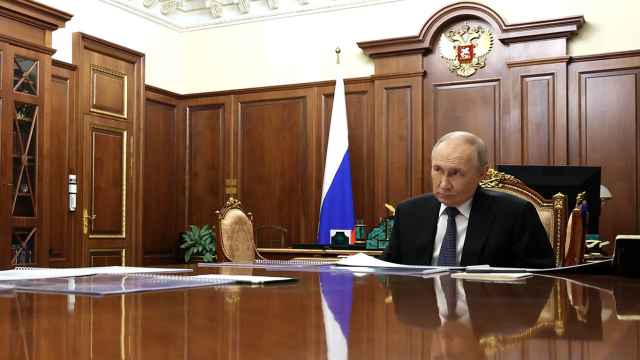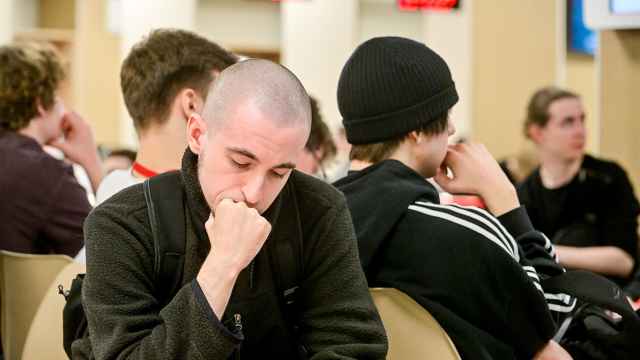VALDAI — Russian officials, opposition leaders and pundits wrestled with the disjuncture between Moscow and Russia's far-flung provinces at an international conference, where two erstwhile political rivals from the mineral-rich Urals region surprised observers by publicly settling their differences.
On Monday, the newly elected mayor of Yekaterinburg and outspoken Kremlin critic, Yevgeny Roizman, stood up and walked across the stage in a resort run by the presidential administration in the northwest Novgorod Region to shake the hand of Sverdlovsk Governor Yevgeny Kuyvashev. Roizman told Kuyvashev, his archenemy and the Kremlin-appointed boss of the region of which Yekaterinburg is the capital, that he wanted to "reset the situation," opposition federal lawmaker Ilya Ponomaryov said in a tweet from the hall.
The encounter between Roizman and Kuyvashev took place as part of a session dedicated to regional diversity during the 10th annual Valdai conference, a Kremlin-backed event that is attended by experts from around the world and top Russian officials, including President Vladimir Putin. Putin is set to meet with participants Thursday.
During the Monday discussion, some members of the panel said Roizman's victory in the Sept. 8 vote was a step toward decentralizing Russia's highly centralized system of government, which was heavily criticized by other participants as both unfair for far-flung regions, and marked by a lack of clarity over distribution mechanisms.
"Centralization has reached an extent unseen in history: [Moscow] is absorbing all the financial, intellectual, scientific and investment resources of the country at the expense of everywhere else," said Vladimir Ryzhkov, opposition leader and co-founder of opposition party RPR-Parnas. About 70 percent of Russian exports come from Siberia, which has 18 percent of the country's population, while Moscow's gross domestic product is 10 times higher than that of Siberia and the Far East, Ryzhkov said.
Most of the country's biggest companies that operate nationwide are registered in Moscow and pay their taxes in the capital. Also, the existing taxation legislation is strongly tilted toward the federal budget, allowing regional and municipal authorities to collect only a few unimportant taxes. The federal government, after collecting most of the taxes, then decides the sizes of subsidies for the regions.
Other panel members defended Russia's taxation system but criticized an opaque system for deciding how federal money is distributed to Russia's regions.
"Only a quarter of all [financial] transfers to the regions are decided by a [tax law distribution] formula, while three-quarters are decided through poorly understood government decisions according to rules that no one knows," said Natalia Zubarevich, director of the regional program at the Independent Institute of Social Policy.
Centralization means that the Kremlin exerts close control over the regions, many of which are dependent on federal subsidies or benefit from large projects initiated by Moscow such as the 2014 Olympics in Sochi or the Asia-Pacific Economic Cooperation (APEC) Summit held last year in Vladivostok.
Senior officials on the panel, however, defended the existing centralized system. An enormous bridge outside Vladivostok built for the APEC Summit was first planned in 1905, said the Primorye region's Governor Vladimir Miklushevsky, but the project could only be realized in contemporary Russia, within contemporary political and budget setups.
Taxes raised in the region only account for 74 percent of the region's income in 2012, according to statistics collected in a RIA Novosti rating.
"Decentralization is a populist slogan," Miklushevsky said. "If you spread everything too thin, you will never do anything," he said, referring to the federal government's capacity to invest money in selected massive infrastructure projects in Russia's regions.
A Message from The Moscow Times:
Dear readers,
We are facing unprecedented challenges. Russia's Prosecutor General's Office has designated The Moscow Times as an "undesirable" organization, criminalizing our work and putting our staff at risk of prosecution. This follows our earlier unjust labeling as a "foreign agent."
These actions are direct attempts to silence independent journalism in Russia. The authorities claim our work "discredits the decisions of the Russian leadership." We see things differently: we strive to provide accurate, unbiased reporting on Russia.
We, the journalists of The Moscow Times, refuse to be silenced. But to continue our work, we need your help.
Your support, no matter how small, makes a world of difference. If you can, please support us monthly starting from just $2. It's quick to set up, and every contribution makes a significant impact.
By supporting The Moscow Times, you're defending open, independent journalism in the face of repression. Thank you for standing with us.
Remind me later.





